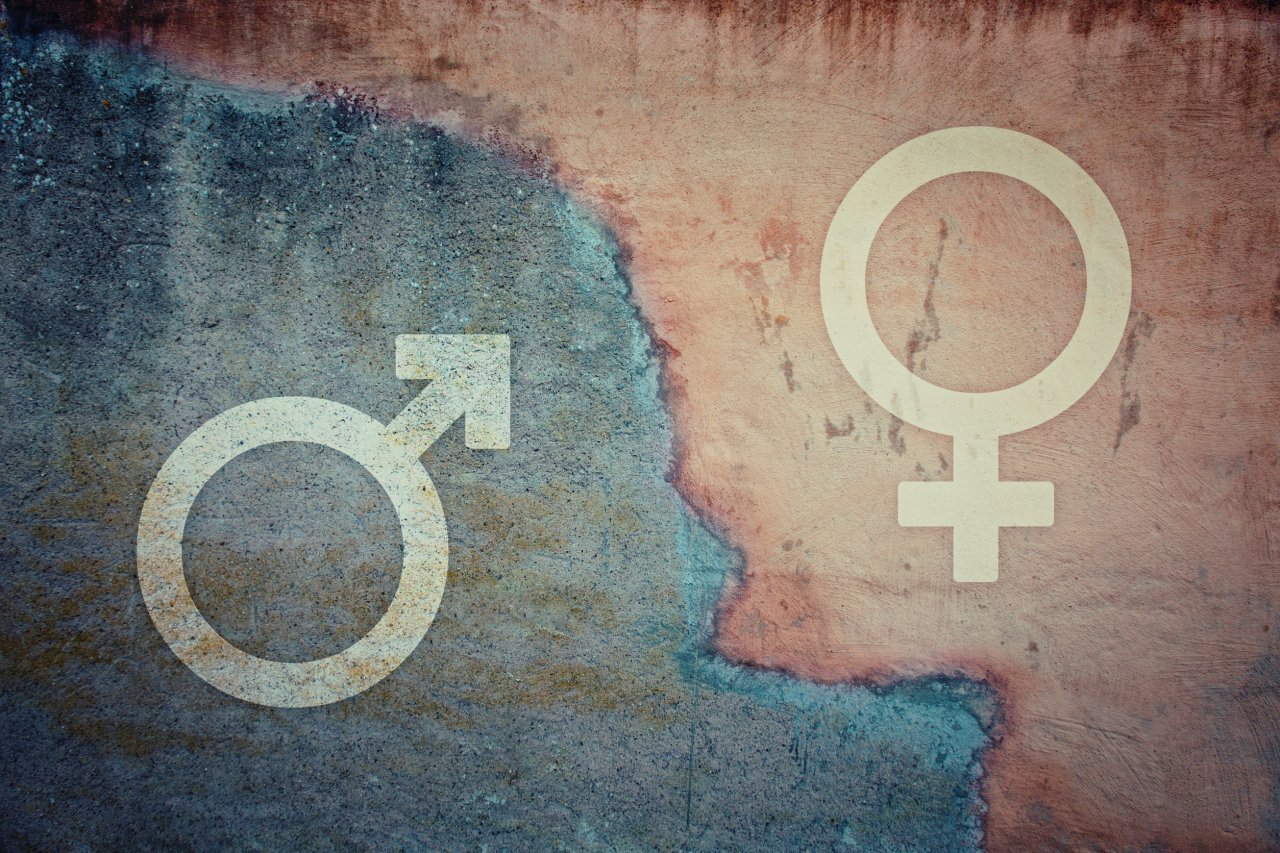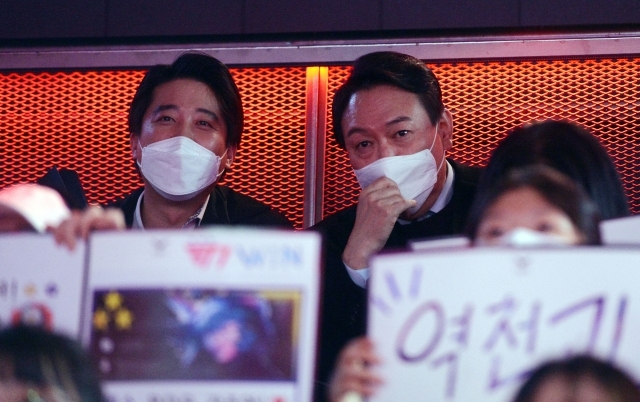Yoon’s strategy to favor young men over women has polarized polls. Will it backfire?
Candidates bring ‘gender gap’ to campaign narratives to secure supporters
By Jo He-rimPublished : March 1, 2022 - 13:22

Along with the parties’ excessive dirt digging, the topic of gender divide has overshadowed policies and pledges in this year’s presidential election, as candidates ramp up gender-biased rhetoric to form their campaign narratives.
In a bid to secure votes from the undecided electorate in their 20s and 30s who are sensitive to gender-related issues, presidential candidate Yoon Suk-yeol of the main opposition People Power Party has taken the side of young men, laying out pledges in their favor.
While the strategy has gained traction among young male voters, some have warned of the “price” the move entails.
“The People Power Party Chairman Lee Jun-seok and Yoon Suk-yeol took the strategy to create a greater gender divide in the electorate, and did get the attention they wanted from the men in their 20s,” Rhyu Si-min, a liberal commentator and former chairman of the Roh Moo-hyun Foundation, said in a TV program on Sunday.
“But they will pay a price (for creating the divide),” Rhyu said, pointing out how young women may make a “strategic” decision to vote for the Democratic Party of Korea’s Lee Jae-myung to prevent Yoon from winning.
But experts warn that fueling the already serious gender gap in society for political gain will have bigger consequences beyond the election.

Picking sides: Way to reach out to swing voters?
While Yoon has never openly stated that he has been campaigning in favor of young male voters, his comments and pledges clearly show he is well aware of the language used by this target group.
In a canvassing speech denouncing North Korea for launching a ballistic missile on Sunday, Yoon said, “The government apparently has spent some 30 trillion won ($25 billion) for gender sensitivity education. If we can use some of that budget for national defense, South Korea would be able to protect itself better.”
Yoon’s remark immediately caught flak for citing misinformation that the government had set aside 30 trillion won for a “gender sensitivity budget,” and also for repeating a false argument shared among users of male-oriented online communities with anti-feminist sentiments.
Those who call for the Ministry of Gender Equality and Family’s abolishment often claim that the gender sensitivity budget is almost equal to the defense budget.
“Budget for gender sensitivity education” is an existing term officially used by the government. However, it does not refer to planning an actual budget for execution. It is the government’s categorization process, in broad terms, to sort out government projects and tasks that may be relevant to gender equality.
Yoon has also put himself at the center of gender-related controversy, having stated that there is no structural gender discrimination in Korea.
A series of Yoon's election pledges have also raised the ire of women, including the promise to abolish the gender equality ministry.
Yoon also vowed to strengthen punishment for false accusations related to sexual violence, which women’s rights activists say this will discourage victims from coming forward.
The party’s youngest-ever chairman, Lee Jun-seok, 37, has also been playing a leading role in building Yoon’s campaign narrative for young men. Even before the presidential race began, Lee was known for his outspoken comments arguing that women in their 20s and 30s do not face gender-based discrimination.
Regardless of the controversy, Yoon’s campaign to woo young men appears to be working, public polls show.
In the latest survey by Realmeter commissioned by OhmyNews on Tuesday, Yoon garnered 54 percent of support from men aged 18 to 29, more than double that of Lee’s 21 percent. Among men in their 30s, Lee Jae-myung was slightly ahead of Yoon with 39.6 percent of support. Yoon followed with 36.8 percent.
When it comes to women between the ages of 18 to 29, Lee had the upper hand, posting 32.4 percent while Yoon stood at 24.8 percent. Among women in their 30s, Yoon posted 38.6 percent and Lee garnered 35.1 percent.
Overall, Yoon was ahead of all contenders, polling at 42 percent. Lee came second at 39.5 percent, as Ahn Cheol-soo of the minor opposition People’s Party and Sim Sang-jung of the progressive Justice Party posted 8.6 percent and 1.8 percent, respectively. Realmeter surveyed 2,052 adults from Thursday to Sunday.
In response to Yoon’s tactics, Lee has continuously criticized him for “intentionally dividing gender groups for his own benefit,” and has reached out to women in their 20s and 30s.
However, Lee has struggled to win the hearts of young women, as he himself has been the subject of criticism for his alleged past discriminatory demeanor. The ruling party’s mishandling of multiple cases of sexual misconduct by its members also factors into its relatively weak support from the electorate.
On Monday, Lee made a post on the female-dominated online community 82cook to greet women there and win support, promising to look after people’s livelihoods. He also uploaded a 29-second video to his YouTube to verify his online post.
Park Ji-hyun, chief of the committee dedicated to rooting out digital sexual crimes on Lee’s campaign team, also urged women in their 20s and 30s to support Lee.
Park was one of the college students who helped bring the “Nth room” incident, a massive cybersex trafficking case, into the open. The ruling Democratic Party of Korea recruited the 26-year-old activist in late January.
Among other outreach measures, Lee also carried on with a rescheduled interview with YouTube channel DotFace, following controversy with some supporters concerning the channel being “feminist.”

Bigger price tag for deeper divide
Gender conflict has risen as a serious social issue in recent years.
According to a survey by Global Research released in June last year, 88.6 percent of 1,000 respondents aged 18 to 39 said the gender divide in the country is at a “serious level.”
Seeing that the election is marked with pledges catering to a favored gender, experts and women’s rights activist groups are also concerned that these election promises have gotten in the way of more concrete policies to address issues relevant to women.
“In the presidential election, what we see are hatred-oriented and populist policies causing more hate and discrimination. What we really need are some radical policies that can bring fundamental changes to the working environment for women,” a union of womens’ rights organizations said during a press conference on Feb. 17.
Eom Gyeong-yeong, the director of local political think tank Zeitgeist Institute, said an election dividing the electorate by gender is likely to entail negative side effects.
“Whoever becomes the president, deepened conflicts will arise as a side effect of the election, and it is likely that society will have to pay the price,” Eom told The Korea Herald.
While Eom sees gender issues as having some influence over the electorate in their 20s and 30s, strong sentiments against the ruling bloc are also playing a big role in affecting the political opinions of voters -- especially men, he said.
“Candidates throw out all kinds of pledges during the election period. And when a new government takes office, they usually make changes to turn the pledges into policies. What the candidates should know is that they should be careful and take time to introduce changes,” Eom said.
For more information regarding the survey results, visit the National Election Survey Deliberation Commission homepage.
By Jo He-rim (herim@heraldcorp.com)





![[K-pop’s dilemma] Can K-pop break free from ‘fandom’ model?](http://res.heraldm.com/phpwas/restmb_idxmake.php?idx=644&simg=/content/image/2024/05/09/20240509050541_0.jpg&u=20240509173751)




![[News Analysis] Yoon's first 2 years marked by intense confrontations, lack of leadership](http://res.heraldm.com/phpwas/restmb_idxmake.php?idx=644&simg=/content/image/2024/05/09/20240509050612_0.jpg&u=20240509233252)








![[Today’s K-pop] NCT’s Mark to drop 1st solo album in February 2025](http://res.heraldm.com/phpwas/restmb_idxmake.php?idx=642&simg=/content/image/2024/05/10/20240510050597_0.jpg&u=)